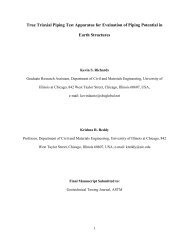Toward a Useful Theory of Mentoring: A Conceptual Analysis and ...
Toward a Useful Theory of Mentoring: A Conceptual Analysis and ...
Toward a Useful Theory of Mentoring: A Conceptual Analysis and ...
You also want an ePaper? Increase the reach of your titles
YUMPU automatically turns print PDFs into web optimized ePapers that Google loves.
only glue holding together highly diverse research. Still, there have been some extensions<br />
<strong>and</strong> departures in conceptualization. For example, researchers now address the possible<br />
negative outcomes <strong>of</strong> mentoring, where barriers prevent mentors from providing<br />
guidance to protégés (Eby, McManus, Simon, Russell, 2000; Eby & Allen, 2002; Hunt &<br />
Michaels, 1983; Ragins & Cotton, 1996; Sc<strong>and</strong>ura, 1998). Eby <strong>and</strong> colleagues define<br />
negative mentoring "as specific incidents that occur between mentors <strong>and</strong> protégés,<br />
mentors’ characteristic manner <strong>of</strong> interacting with protégés, or mentors’ characteristics<br />
that limit their ability to effectively provide guidance to protégés" (2002, 3).<br />
Some researchers have extended their mentoring definitions to include alternative<br />
forms <strong>of</strong> mentoring such as peer mentoring (Bozionelos, 2004), formal <strong>and</strong> informal<br />
mentoring (Chao et al., 1992), <strong>and</strong> diversified mentoring, relationships where individuals<br />
<strong>of</strong> different racial, ethnic, or gender groups engage in mentoring (Ragins, 1997a,b).<br />
While one can perhaps argue that the core meaning for mentoring remains in wide use, it<br />
is certainly the case that multiple meanings have added complexity <strong>and</strong> in some instances<br />
ambiguity. <strong>Conceptual</strong> clarity seems to have hampered theory development. As Merriam<br />
notes, “how mentoring is defined determines the extent <strong>of</strong> mentoring found” (1983: 165).<br />
Concept as a Precursor to <strong>Theory</strong><br />
The most important rule for developing a useful concept is to be able to state its<br />
boundary conditions such that we know with some confidence that “X” is an instance <strong>of</strong><br />
the phenomenon, but “Y” is not (Kirshenmann, 1981; Rosenberg, 2005). Few extant<br />
concepts <strong>of</strong> mentoring satisfy the boundary rule. It is certainly easy to underst<strong>and</strong> why<br />
this is the case. The term, mentoring, shares “concept space” with closely related<br />
phenomenon such as coaching <strong>and</strong> apprenticeship. At its most elemental, mentoring is<br />
8



